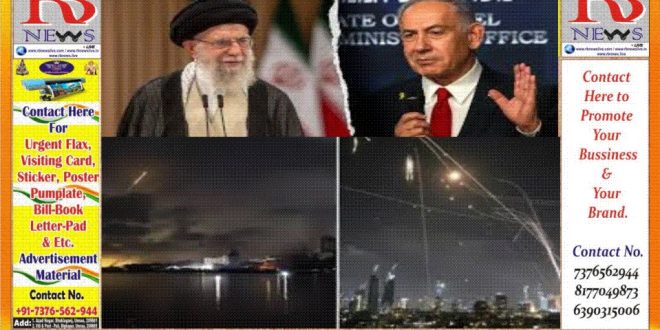On the morning of June 13, the Israeli army attacked more than 100 targets in Iran with more than 200 fighter jets, in which most of the nuclear and military targets were attacked. In these Israeli attacks, top officials like Iran’s Revolutionary Guards chief Hussein Salami, Iranian Army Chief of Staff Mohammad Bagheri, Ali Shamkhani, a close aide of Iran’s Supreme Leader Ayatollah Ali Khamenei, and IRGC Air Force Commander Amir Ali Hajizadeh were killed. Israel named its operation Rising Lion.
Iran responded to Israel’s ‘Operation Rising Lion’ with ‘True Promise 3’
Israeli Prime Minister Benjamin Netanyahu said that this operation will continue until Israel’s security is ensured. In response, Iran also carried out rapid attacks on Israel and fired missiles in many cities including the capital Tel Aviv and caused devastation. Iran has named this operation True Promise Three. Iran fired more than 150 ballistic missiles at Israel under the ‘True Promise 3’ military operation, of which 6 missiles fell in the capital Tel Aviv, killing a woman. At the same time, 63 people were injured. Iranian media reports have claimed that Iran also targeted the Israeli Defense Ministry.
Know the big things in 10 points
- On Friday, Israel carried out its biggest attack so far aimed at preventing Iran from developing nuclear weapons. Israeli forces said they were actively intercepting a “shower of missiles” fired by Iran, as air raid sirens sounded in several cities. At least 35 people have been reported injured in Tel Aviv. Explosions were also heard in Jerusalem.
- Israel again attacked Tehran, with several explosions heard in the Iranian capital. According to local media reports, two projectiles struck Mehrabad Airport, located near key Iranian leadership sites and an air force base that houses fighter jets and transport aircraft. Flames were seen at the site. Saturday’s attack was the third after two airstrikes late Friday.
- Israeli Prime Minister Benjamin Netanyahu warned that “more attacks on Iran are coming”, declaring that Israel’s efforts to dismantle Iran’s nuclear program have “only just begun.”
- In a new statement, Netanyahu said the attack was against a “murderous Islamic regime” that oppresses and impoverishes the Iranian people. He stressed that the operation aims to eliminate the “existential threat” posed by Iran.
- Iran’s ambassador told the UN Security Council that 78 people were killed and more than 320 injured in Israel’s repeated attacks on Iranian nuclear sites, generals and scientists on Friday, but he said “the majority” of the victims were civilians.
- The ambassador spoke shortly after Iran retaliated with long-range missiles targeting the Israeli capital Tel Aviv, injuring at least 34 people, Israel’s paramedic service said.
- Iran has closed its airspace and imposed a state of emergency across the country in view of the current situation. The Israeli Defense Force claims that their air defense system destroyed most of Iran’s drones and missiles. Iran demanded an urgent meeting of the UN Security Council and described the Israeli attacks as aggressive military action.
- Meanwhile, a red alert has been issued in Israel and citizens have been instructed to stay in bunkers.
- Iran’s state news agency IRNA said hundreds of ballistic missiles have been launched. Less than an hour earlier, air defenses in Iran were activated as a result of Israeli airstrikes. In a post on X, the Israeli Air Force said it continues to “strike missile launchers and infrastructure” in Iran.
- For years, Israel had threatened such an attack and successive US administrations had tried to prevent it, fearing it would spark a wider conflict in the Middle East and possibly be ineffective in destroying Iran’s scattered and hardened nuclear program. When the Iranian missiles and Israeli interceptor rockets left trails of smoke and flame in the night sky, Iran’s supreme leader Ayatollah Ali Khamenei vowed not to let Israel “escape safely from this great crime.”
 RB News World Latest News
RB News World Latest News






